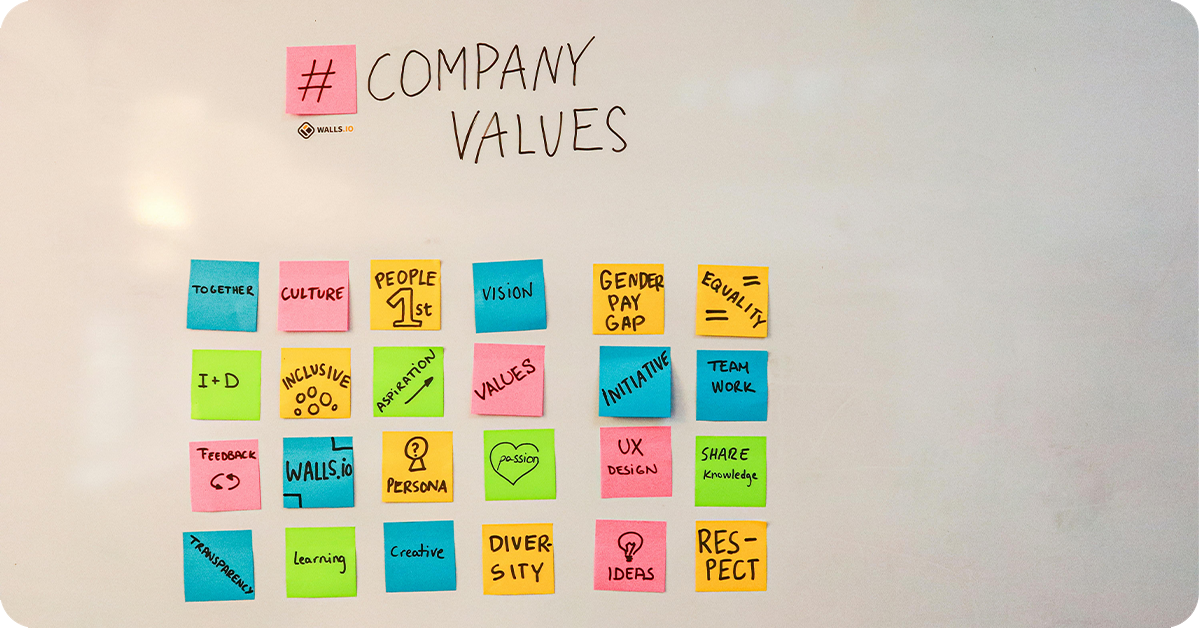Apr 9, 2024
It’s an important question; how to research a company before an interview. Pivotal to the success of an application, perhaps the difference between getting a job and facing rejection, researching companies can feel like a complex task – where do you start? After all, the job needs to be right for you, as much as you need to be right for the job. A company’s values and ethos should align with your own and their mission should be one that you want to help work toward. All of which is information you need to find out from researching the company beforehand and whilst there isn’t exactly a comprehensive list of what you need to know before interviewing there are a select number of things of which are beneficial to have an understanding or awareness of.

1. Values and Ethos
A company or brand’s values and ethos are the beliefs, philosophies and principles that drive or guide the way in which business is conducted. They can be related to anything and are often similar to personal values and beliefs, but with a business focused spin on them, e.g. environmentally conscious, inclusive, customer-centric, bold, innovative and cutting-edge.
Companies tend to carry their brand values in almost everything they do; from the tone of voice they take in their written communication to the style of their visual advertisements. If these aren’t explicit enough, you can tend to read about them on the company website under the ‘About Us’ section. When researching companies, a lot of time should be spent on the website with particular emphasis placed on the ‘About Us’ page or pages.
2. Job Description
This may sound like an obvious point to make, but it is important to read the job description cover to cover and then back to front. There should be plenty of useful information included in the job description that you can decipher insight on the company from, it might not always be one hundred percent accurate, but it also provides questions to clear up at the interview itself, such as:
- Working hours and location – can often give away how flexible a company is with things like working from home, families and life appointments than may arise. Some companies will require you to book holidays for things like dentist appointments, or seeing your nephew in his Nativity, on the other hand some companies may actually encourage you to not miss important family things and simply make the hours up once you get home. It all depends on the company’s attitude and trust, which can be inferred from the job description.
- Salary – can sometimes suggest how much room for progression within your role there could be. If the role is advertised with a salary range, then you can see that the company is willing to work with a scale of pay based on value and experience. There is the potential to work your way up the pay range and then once you max what was offered for your role, you can start looking at progressing into a more senior role. Salary should also inform you whether bonuses will be paid and what KPI’s (Key Performance Indicators) you need to meet. If there is not a breakdown of the commission structure on the job description, then it provides another great opportunity to discuss this in the interview and get it down on paper.
- Values and ethos – sometimes these can also appear in the job description as employers may list a few of their values in hope of matching with candidates who share similar.
- Responsibilities – should always be listed and will help give you a view into what day-to-day life on the job will look like. The list will most likely not be exhaustive but will cover the most common and essential tasks. From this you can pick apart where your existing qualities will fit in and prepare to demonstrate this to an interviewer should they question you about it. It will also allow you to see where you fall short, so that you can also address this if necessary or even show initiative by starting to upskill in these areas before your interview.
- Reporting to – can suggest company structure, size and hierarchy. If the role is a Marketing Executive that directly reports to the CEO, you would say it is safe to assume that the company is only small or has a flat hierarchy from which you can decide if this is a way in which you like to work. You may also be able to find out more about leadership teams and do some research into them via LinkedIn etc.
3. Company Website
Company websites are a great source of information, not only can you see a visual representation of a company, but also you can deduce how they want to be perceived by their audience from the written content that populates the site pages. You can look at the product and/or service in which they champion and how well they do so. It would be advisory to do some research into what they offer, so you can understand the market and industry a little better, or at least the company’s position within the market. Researching competitors will also provide a good insight of the industry and how the company you are applying for stacks up.
4. Company Reviews
Websites like Indeed, Glass Door and Trust Pilot can provide insight on what it is like working for companies, typically from current or ex-employees. A wealth of information is available including:
- Reviews
- Salary
- Open jobs
- Office location(s)
- Company size
- Industry
- Company overview
- Compensation and benefits
- Culture and values
- Diversity and inclusion
- Work/Life balance
- Career opportunities
- Senior management

5. Social Media
In the new age, a company’s social media presence is arguably one of the most important things, particularly to younger audiences, (Millennials and Gen Z), and it certainly can tell you a lot about a company – potentially more than what their website can. It’s the perfect place to see the company interacting (or not) with its audience, from LinkedIn to Instagram, Facebook to TikTok. It’s also an excellent chance to see how up to date the brand is staying with technology and platforms, are they remaining relevant and have a large interactive following, or are they hopping on trends from 2014 and wondering why their strategy isn’t working?
6. Companies House
Companies House is a useful tool to check when companies have been incorporated and dissolved, as well as registering accounts and reports. Similar websites that can help provide a financial insight into how a company is performing are the likes of Endole. Researching company’s financial information helps give you an insight into whether or not it is a safe and secure long-term prospect by working for them, and also to ensure that what they are doing is all registered and above board.
7. Ask People You Know
First-hand experiences are always the best source of information, if you know somebody, or know someone… who knows someone, then you’re unlikely to get better insight than a person who has been there and done it themselves. Obviously, this can be rather difficult if the company you are applying for is a start-up with three employees including the founder and his wife, but that doesn’t mean you shouldn’t ask around to see if people have heard of it, and better yet, have an opinion on them.
8. Google
It might sound fairly obvious, but you should be Googling the name of the company and trawling through news articles, if there are any that is. Again, if it’s a multi-national conglomerate then it will be far easier to come across stories than smaller businesses, however, that also means that you will have to do more filtration as it could be there will be a portion that isn’t necessarily relevant to your job.
9. Go the Extra Mile
It may sound like a stretch, but in the long run it could give you a leg up in the interview and may help you stand out from the crowd – go through the customer journey. Call the number on the company website and act as though you are an interested party, enquire on the web form and see how long they take to respond. Take the opportunity to see how things work from an external point of view to give yourself a competitive advantage.
10. Research the Job Role
This point is not quite related to the researching companies directly, however, doing your due diligence on the job role you are applying for will not only give you a better understanding of what you are getting yourself into – in case you didn’t already know – but also, it will give you an insight into how much crossover there is in the job role you have applied for and others out there. Is the job you have applied for asking less or more of you in the role than other companies? Have they advertised for a Social Media Manager, but have listed the roles and responsibilities of a Chief Marketing Officer? It’s important to have an awareness of what will be expected of you and what is a fair expectation in the wider industry of the job role.
Researching companies before going for an interview is, as aforementioned, a crucial part in ensuring that the job and the company itself is right for you. Not only will you equip yourself with a wealth of knowledge about the business and where they sit within the industry they are operating in, which will surely impress the interviewer, but you are more likely to feel more at ease going into the interview. Amassing a great deal of information about a company puts you in good stead as you will know what you are talking about and can have a meaningful and open discussion about the position advertised, how you can plug the current gap they are wanting to fill and where the business fits in with your expectations as a job seeker. After all, it is a two-way street
For apprenticeship courses that skyrocket careers, and companies that are out of this World, take a look at our current vacancies or get in touch with our amazing talent team.
Here at Apprentify, we pride ourselves in offering a unique approach to finding, recruiting and training the best digital and technical apprentices from start to finish. As one of the top apprenticeship training agencies, we have taken our time in developing our specialist apprenticeship programmes; so whether you are looking to advance your career or develop your team, we can make it happen as your apprenticeship provider.



